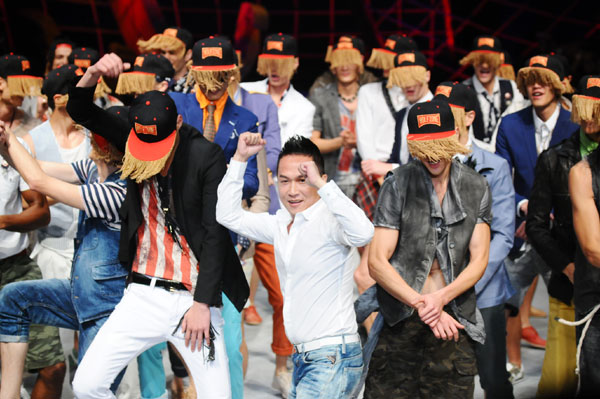
 'Taken 2' grabs movie box office crown
'Taken 2' grabs movie box office crown
 Rihanna's 'Diamonds' tops UK pop chart
Rihanna's 'Diamonds' tops UK pop chart
 Fans get look at vintage Rolling Stones
Fans get look at vintage Rolling Stones
 Celebrities attend Power of Women event
Celebrities attend Power of Women event
 Ang Lee breaks 'every rule' to make unlikely new Life of Pi film
Ang Lee breaks 'every rule' to make unlikely new Life of Pi film
 Rihanna almost thrown out of nightclub
Rihanna almost thrown out of nightclub
 'Dark Knight' wins weekend box office
'Dark Knight' wins weekend box office
 'Total Recall' stars gather in Beverly Hills
'Total Recall' stars gather in Beverly Hills
Menswear the wolf in the pack
Updated: 2013-02-04 10:03
By Lv Chang (China Daily)
|
||||||||
 |
|
Liu Yiqun (middle) is general manager and chief designer of Wolf Zone. Provided to China Daily |
Chinese men's fashion doesn't stretch much beyond the Mao jacket or Zhongshan suit in the world's eyes. But for the past 15 years, since his time as an art student, Liu Yiqun has been tailoring ways to change that image.
In the process, as well as creating a fresh, distinctive and more casual style of menswear, the Shishi-born, Fujian province designer has stitched a noted fashion label, Wolf Zone, on to China's growing collection of brands.
Liu's latest collection graced the catwalk at the closing ceremony of China's Fashion Week in Beijing in October, and he's been invited to participate in the Who's Next in Paris showcase event at the city's fashion week. He has recently been rated as one of China's top 10 designers.
|
 |
|
 |
|
 |
|
 |
With 200 stores across China, Wolf Zone ranks as an entrepreneurial success as well as a design one. And therein lies the problem, albeit one that many up-and-coming fashion designers would wish to have.
After years of finding his way in the industry, 42-year-old Liu is still struggling to find a balance between his roles as designer and entrepreneur.
"There is a huge gap between your ideal product and the market," he says. "As a designer, I care about my products, whether we are using the best material to present my work, and I want to follow my heart. But as a businessman, I have to consider the cost and what the market needs."
Wolf Zone, launched in 2004, posted a turnover of 100 million yuan ($16.1 million) in 2012, and Liu plans to increase the number of stores to 300, spreading from southern China, to the north of the country.
Liu opened his first store in 1997 while still a student majoring in art at Xiamen University in Fujian province.
"At first I didn't tell clients those clothes were designed by me, because I was afraid that it would drive the brand-conscious customers away," he says.
"But later, as my stuff flew off the racks, and they became regular clients, I decided to tell them the truth. Surprisingly, they took it well and continued to support me."
By 2004, he had enough capital to start his own label and take on a new series of challenges in moving from being a fashion buyer to an independent designer.
"Setting up a new label involves endless work," he says. "You have to design the clothes, source fabrics, organize events, seek out buyers and do marketing. Each step is difficult."
In the early years of Wolf Zone, he often worked late into the night, occasionally doubling up as tailor.
Wolf Zone works on a "light asset operation" business model that involves outsourcing most production and transportation requirements. It's an approach that helps the company focus on its core areas of design, marketing and distribution.
"It's been tested as the best business model and many Western designer brands like Armani and Versace are working that way," he says.
It has also led the company to set up more direct-sale shops and increase investment in logistics and factories.
Being a mid- to high-level range of men's clothing, Wolf Zone competes well with Western brands such as Replay, Diesel and Energy. The price of a Wolf Zone pair of jeans ranges from 500 yuan to 3,000 yuan, depending on the fabrics and prints.
China's creative industry is still growing, with a market that seems more interested at present in fast fashion rather than fashion as art that reinvigorates the cultural beauty of the past.
But, says Liu, a brand such as Wolf Zone, which targets a small group of people, doesn't want to compromise quality and brand image to simply pursue higher profit.
"It's about whether you have a long-term vision," he says.
lvchang@chinadaily.com.cn
Most Viewed
Editor's Picks

|

|

|

|

|

|
Today's Top News
Boston bombing suspect reported cornered on boat
7.0-magnitude quake hits Sichuan
Cross-talk artist helps to spread the word
'Green' awareness levels drop in Beijing
Palace Museum spruces up
First couple on Time's list of most influential
H7N9 flu transmission studied
Trading channels 'need to broaden'
US Weekly

|

|







